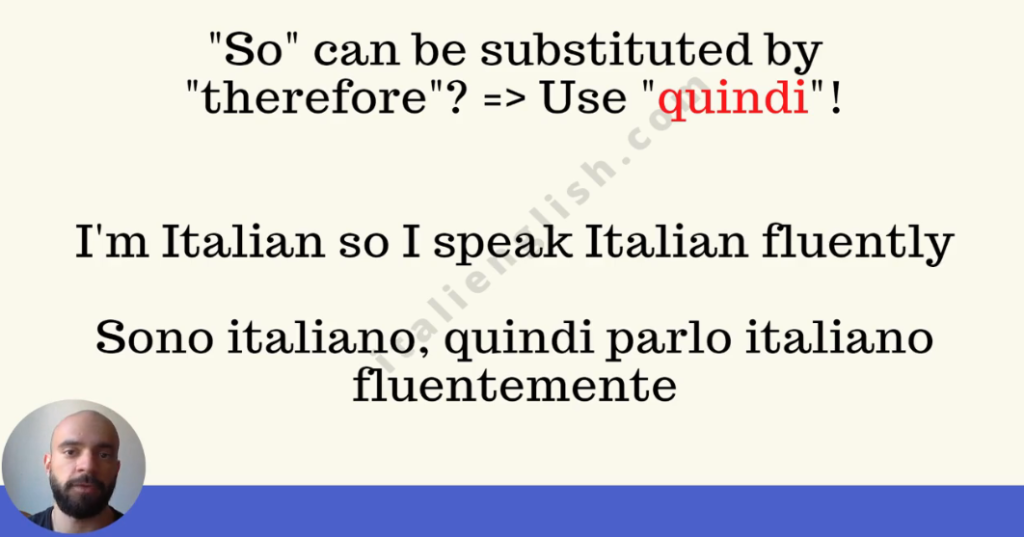earning a new language can be both exciting and challenging. One aspect of language learning that often confounds learners is the translation of certain words or phrases from one language to another. In this blog post, we will delve into the world of Italian grammar and explore the translations of the English word "so" into Italian. Specifically, we will discuss two Italian alternatives for "so": "quindi" and "così." These expressions have subtle differences in usage, and understanding them can greatly enhance your proficiency in Italian. So, let's embark on this linguistic journey together!
Content
Content
Thea Beauty of Italian
Italian, known for its musicality and rich cultural heritage, has captivated language enthusiasts worldwide. One reason for its popularity is its relatively straightforward grammar and vocabulary compared to some other languages. This linguistic simplicity has contributed to the widespread adoption of Italian across the globe. While English may have become a lingua franca due to historical reasons and globalization, Italian remains a language admired and cherished by many.
Unraveling "Quindi" and "Così", the Two Translations of "So"
In Italian, the English word "so" can be translated into two distinct expressions: "quindi" and "così." Each has its unique applications, and understanding their differences is crucial to using them correctly in context.
- Quindi: The Italian word "quindi" is equivalent to "therefore" or "consequently" in English. It denotes a direct consequence or logical inference resulting from a given situation or premise.
Example:- English: "John must arrive here soon so we can get to the airport on time."
- Italian: "Giovanni deve arrivare qui presto, quindi possiamo arrivare in aeroporto in tempo."
In this case, the arrival of John directly leads to the possibility of reaching the airport on time.
- Così: The Italian word "così" is akin to "so that" in English. It implies a purpose or goal associated with the action mentioned in the sentence.
Example:- English: "I'm studying Russian so I can go to Russia."
- Italian: "Sto studiando il russo così posso andare in Russia."
Here, the purpose of studying Russian is to enable the speaker to travel to Russia.
Do you like what you've read so far? Wanna grab a FREE 4-videos series? Subscribe to my newsletter!

I'll notify you of new articles and send exclusive content. Don't worry! No spam, no unwanted emails, and no sharing your data with third parties.
Exploring More Examples of "Quindi" and "Così" in Italian
To further grasp the distinctions between "quindi" and "così," let's explore additional sentences that employ these expressions:
- Sentence 1:
- English: "They are annoyed at the moment, so it's better to leave them alone."
- Italian: "Sono arrabbiati al momento, quindi è meglio lasciarli soli."
The expression "quindi" is used here because the annoyance directly leads to the conclusion of leaving them alone.
- Sentence 2:
- English: "I just turned 21, therefore I can finally order a beer."
- Italian: "Ho appena compiuto 21 anni, quindi posso finalmente ordinare una birra."
In this case, "quindi" is employed because reaching the age of 21 directly enables the ability to order a beer.
- Sentence 3:
- English: "Mike wants to improve his Portuguese so that he can have a better experience in Brazil."
- Italian: "Mike vuole migliorare il suo portoghese così può avere una migliore esperienza in Brasile."
Here, "così" is used to indicate the purpose or goal of improving Portuguese, which is to enhance the experience in Brazil.
When to Use "Quindi" or "Così" in Italian
Determining whether to use "quindi" or "così" depends on the context and the type of consequence or purpose implied in the sentence. If the sentence expresses a direct consequence or logical inference, "quindi" is the appropriate choice. On the other hand, if the sentence highlights a goal or purpose, "così" is the more fitting option.

Common Language Learning Pitfalls
As we explore the intricacies of Italian grammar, we must appreciate the unique aspects that make this language so alluring.
One such characteristic is the flexibility and expressiveness of Italian, allowing speakers to convey emotions and intentions with precision.
Moreover, learning Italian opens the doors to the rich cultural heritage of Italy, including its art, music, literature, and culinary delights.
That being said, while mastering "quindi" and "così" may seem challenging at first, language learners should embrace the occasional missteps as part of the learning process.
Making mistakes is a natural part of language acquisition and should not deter learners from pursuing their linguistic goals. Remember that language learning is a journey, not a destination.
Conclusion
Learning a foreign language allows us to glimpse into the soul of a culture and fosters understanding between people from different backgrounds. In Italian, the subtle nuances of "quindi" and "così" showcase the language's depth and elegance. By mastering these distinctions, language learners can better express themselves and truly connect with Italian speakers.
So, whether you're planning a trip to Italy, exploring Italian literature, or simply seeking to broaden your horizons, embracing the beauty of Italian grammar will undoubtedly enrich your linguistic journey.
Do you want to get access to my Italienglish Mentoring Program?
13+ hours of video library, daily assignment, accountability, live calls and private Facebook group.
In 3 months you WILL be able to speak Italian, it's a promise!
